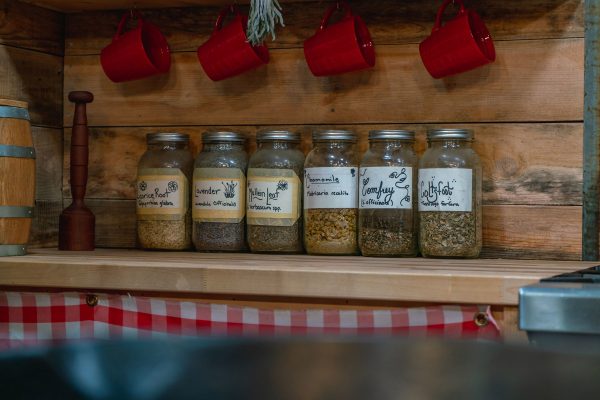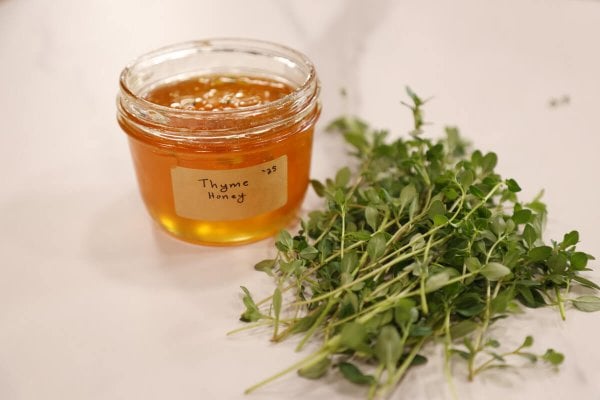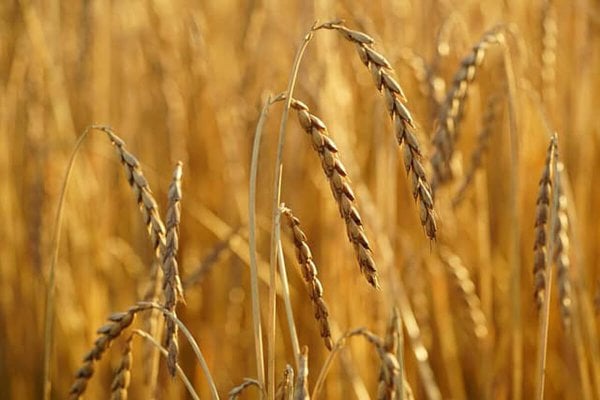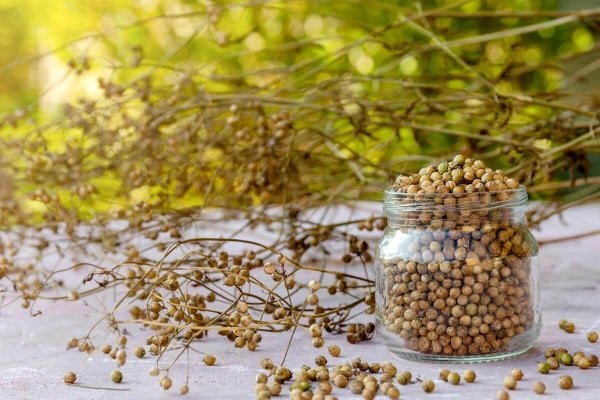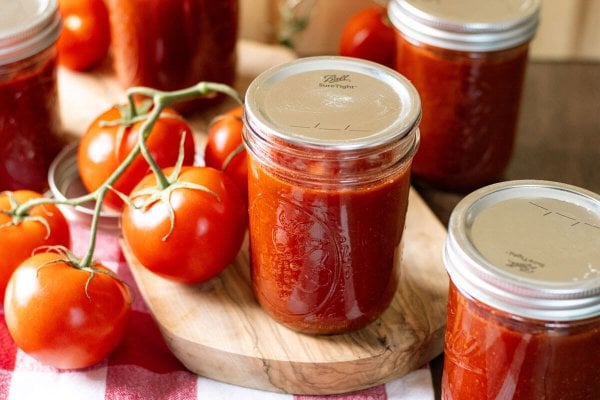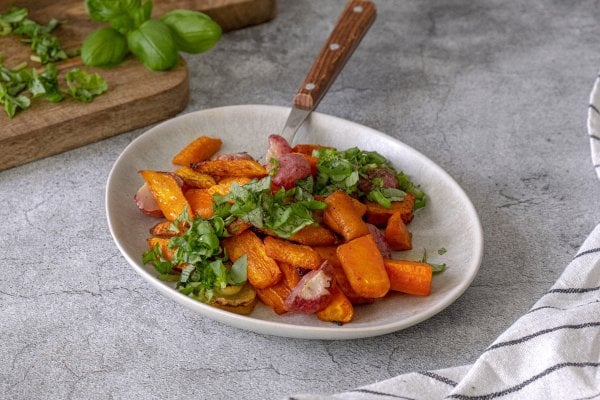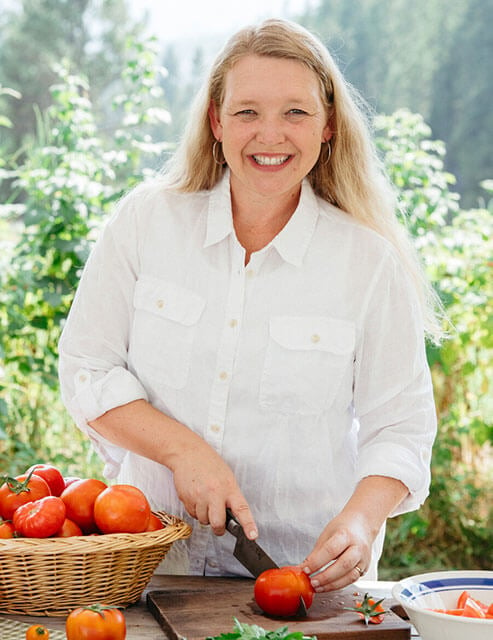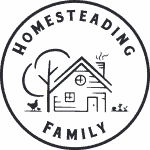Welcome to another episode of the Pantry Chat. This week we’re catching up with everything happening with us here on the homestead and answering some of your questions.
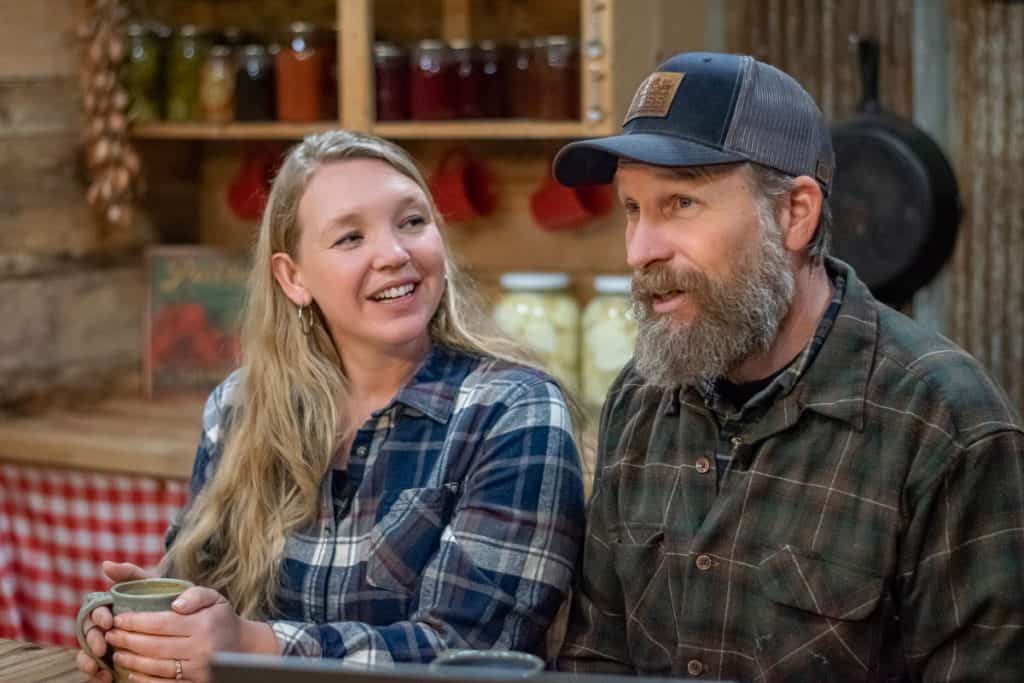
Check out the show notes below for a list of all the topics we’re covering and any related links mentioned in this episode.
In This Episode
- The Traditional Skills Summit was a huge success and many of you jumped in and joined the school as our Founding Members. If you’d like more info on the School of Traditional Skills, click here.
- Big chicken butchering day. We harvested 200 chickens in a weekend and got them all packaged and ready for storage. We tucked the chicken head and feet inside the carcass because we love utilizing the entire animal when making broth. Learn how to make a nutritious bone broth here.
- We received four large bags of yarn from the wool mill made from our Cotswold’s wool. We also have some that was mixed with Icelandic wool (watch the video at minute 8:36 to see the wool).
- New barn space, expanding our storage space for animal feed. We have a lot of people to feed, which means a lot of animals to raise and subsequently a lot of animals to feed. We try to buy and store our animal feed in bulk, and to do this, we need dry areas to store it. Learn more about stocking your barns for winter here.
- We finished our retaining wall and have added a new perennial garden area. This will house some fruit trees as well as our raspberries and other perennial bushes.
- We’ve been stacking productivity in the garden areas by utilizing the edges. We inoculated the walkways in the garden with wine cap (King Stropharia) mushrooms this year and it worked so well. We’ll be growing mushrooms in the new perennial garden area as well.
- We’re starting a soap challenge in the Homestead Kitchen membership area. If you’re not a member, you can find out more about the Homestead Kitchen membership here. We’ll open it up for a limited time so you can hop in and join this challenge. In the soap-making class, we’re covering the basics of cold-processed soap making and will be creating multiple different bars of soap (including a shampoo bar, a shaving bar, a moisturizing soap, and more).
- We’re extending the garden season by using row covers for all our greens. Check out our method for growing greens year-round here.
- We continue to notice the increasing cost of groceries. Read this post on ways to beat inflation at the grocery store, how to prepare for inflation and food shortages here, and this post on how to stock your pantry.
- Check out this recipe for Homemade Dream Cheese.
- Learn more about our farm watering systems.
- Learn how to preserve culinary herbs three different ways here.
- Check out Carolyn’s Practical, Homemade Dairy Masterclass.
- Read or watch our one year Harvest Right Freeze Dryer review.
- Is raw milk healthy to drink? Read this post on the anatomy of raw milk and why cleanliness is the most important thing to consider.
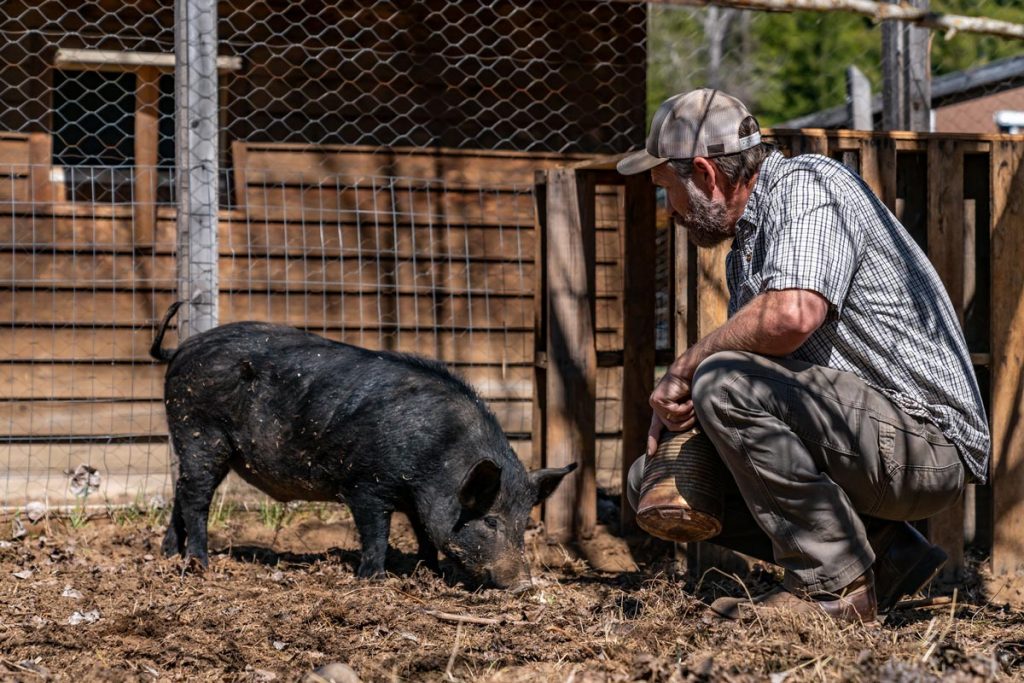
More Posts You May Enjoy
- Apartment to 40 Acres – Our Homesteading Journey
- 10 Things I Wish I Knew Before I Started Homesteading
- 8 Things You Need to Know When Buying Homestead Property
- How to Buy a Homestead – What To Know Before You Buy
- 7 Things You Must Do On Your New Homestead
- How to Pivot When Things Go Wrong on the Homestead
- Best Homesteading Books for the Novice or the Pro
- Organizing Your Property’s Permaculture Zones
- Things to Consider BEFORE Going Off-Grid
- Direct Primary Care – Going “Off-Grid” With Your Health
- When Homesteading Feels Urgent
- Homesteader’s Christmas Gift Guide
Josh: Hey guys, this is Josh.
Carolyn: And Carolyn.
Josh: With Homesteading Family, and welcome to this week's episode of The Pantry Chat: Food for Thought.
Carolyn: This week we are just catching up, we're going to answer a few questions, just getting back into the role of it after we've been a little hit and miss the last little bit. We've been a little busy.
Josh: A lot going on.
Carolyn: We've had a lot going on.
Josh: Today's Pantry Chat's going to be a little Wily Wednesday. We're going to talk about some stuff that's been going on with us, answer a few questions.
Carolyn: It's Wily Wednesday?
Josh: Yeah, I had to come up with something, because I had one for Friday but these don't come out on Fridays. They come out on Wednesdays.
Carolyn: Wily Wednesday. I like it.
Josh: We film them on Wednesdays, so it's Wily Wednesday. Anyways, there is a lot going on so we're going to definitely be answering some of your questions and just chatting about what's going on here because it is crazy time, and maybe it's always crazy time. It really has been the good stuff.
Carolyn: Lots of really good stuff, but I think before we even start, those of you guys who are listening by podcast might be hearing in the background and you're going to see us start wiggling a little bit if you're watching, and that's because we are sitting in front of the second fire of the season. We had our first hard frost this morning, at least down in the bottom part of the property. So the kids gardens are down there. We're still waiting for the sun to really come out and see. We watered before the sun hit it, so we'll see what we saved, but it was a pretty hard frost.
Josh: You guys know that trick right? I know we've talked about it here, but if you're a new listener, new and you have a garden and you're transitioning from summer to fall, and we often get these frosts and they're just one here and there, and they can kill your plants but it's not necessarily the end of the gardening season. And so if you get a frost and even a light freeze, I've had this work actually for hard freezes on small plants, but even a light freeze, overhead water somehow your plants before the sun hits and it will save your garden. And in our area sometimes it gives us another month, another four weeks.
Carolyn: It can.
Josh: And that is huge. So anyways, nice tip. We did that this morning. We haven't been out yet to see how it went. And I think it was just the lower garden, the kids' gardens down lower. I think up above we were just above it, so we'll see.
Carolyn: Hopefully. But we're sitting in front of the fire and it might get a little warm.
Josh: It's already toasty. Somebody tell us if it starts smoking.
Carolyn: If we start smoking.
Josh: Fire does feel good though. The kids were saying this morning, "Oh, there's nothing like a wood fire. It just makes you feel good."
Carolyn: Absolutely. Well, there is a lot going on behind the scenes, so before we jump into answering any questions, what have you been up to?
Josh: Wow, what have I been up to? Well, as a lot of you know, and we won't keep talking about this forever, but it's a big moment in our life, we just launched the School of Traditional Skills. So it's a couple weeks ago now by the time you get this, but it's the first Pantry Chat we've done. And honestly just recovering from that and finding a new normal. A lot of you that have been tracking along, have been traveling, working with all of our instructors in the school, filming, producing these wonderful classes and then getting ready for the summit that we had, and that was fantastic. That was a lot of fun. I know there was a whole lot of you there and a whole lot of you are now in the new school and so glad that you joined up with us on that and became a founding member.
And hey, we're going to be talking soon, so keep your eyes on your emails for that if you are a founding member because we're going to be talking about what classes in the school are next and what kind of features do you want next. So just little note there. But just getting past that, getting rested up. Six hours a day live for four days in a row wore me out.
Carolyn: Absolutely. I can't even imagine that. That's a lot of hard work.
Josh: But it was fun.
Carolyn: So if we look a little tired today, you'll know what's going on.
Josh: We're in fall harvest and getting ready to get all our firewood in and the homestead keeps going. We've got barn edition and we're trying to get our hay under roof and there's just a lot happening, but that's good. It's all good stuff. And winter will come, weather will come, and we'll slow down and it's probably a good thing.
Carolyn: It's time for a little bit of a slow down, I think.
Josh: I think it's good. God's way of just saying, "You need a little extra rest. You need to take it easy."
Carolyn: I am thankful my energy is coming back up, getting out of the first trimester of pregnancy. I'm solidly into my second trimester now and so I'm starting to feel a little more energetic, but when you're already tired and you're already a little low from something like a first trimester of pregnancy and then you have so much going on, it starts feeling hard to keep up, so I'm happy for the slowdown. Now, there's another thing that we did a couple weeks ago that I wanted to share with you guys because we have not even talked about it yet, and that is we had our big chicken butchering day.
Josh: Our chicken butchering day.
Carolyn: We came up with just shy of 200 chickens. And I had this moment where I... Let me think of how do we explain this. We raised about 150 chickens for ourselves and then our son raised about 50 to sell.
Josh: Yep. He's starting a little farm business.
Carolyn: He is. And he sold right out of all his chickens immediately just about when he announced them. Long before we came to butchering. And so we were helping out and just put the ones that he was selling into the process along with the ones we were doing for the family. And so we're going along, we're doing it the way we do it, and we get all these things packaged up and I realized...
Josh: I know where you're going with this.
Carolyn: We just put heads and feet of chickens in all of the chickens that he had sold to people. And so some of you guys I know would get really excited about that, getting the heads and the feed, but that's what we do for us.
Josh: For good nutritious broth, you'll want those things.
Carolyn: You really do, just so many nutrients in there. And one of the things we've been slowly working, it's a slow process but we've been working at doing is using more and more of the animal all the time. And so this year the more of the animal step was including the heads in there. And I mean the whole heads, neck and up, everything's there.
Josh: And I know this freaks some of you guys out, but it's not freaky. Sally Fallon, Nourishing Traditions, who as an instructor at our school has actually got me thinking about it because she did it in the class. And I was like, "Whoa, I never even thought of putting the heads in there." And she's like, "Oh, yeah, this is a great collagen source. Why are you throwing it away?"
Carolyn: Actually, the heads have a lot of gelatin in it also.
Josh: The gelatin, which helps.
Carolyn: Which the feet have a lot of the collagen also and the gelatin, so those would two make this wonderful addition to your broth of these other things. And so it adds things that you're not going to get in other ways.
Josh: And these things sometimes maybe freak some of you out, but you guys just got to realize something, our perspective, our modern perspective of not using things like that in a human context is the abnormality. We're the ones that are abnormal because we're freaked out about not using some of these things. The human context, we've had to make use of everything and good use and God made it so that you can use just about everything well. So it's really not that freaky. It's a mind shift for some of us that we need to make. It's actually good stewardship and it's creating good nutrition and health.
Carolyn: Well, we had to make sure that as Connor's chicken customers came...
Josh: We didn't give them a warning. We didn't think about it.
Carolyn: And picked up their chickens, we gave them full warning, "There is a head inside the cavity of everyone of these birds and I'm sorry if that disturbs you." So just know that if you ever buy chickens from our son here on Riverbend Pasture Chickens, then you get all of the goodies.
Josh: And that's [inaudible 00:08:13] You get all the goodies, because we want to spread the love and the flavor.
Carolyn: So there's a few other things that I wanted to share coming from the farm, and that is some of you guys have been following along as we got our new Cotswolds this last fall and the first of my Cotswolds wool, and some of it's blended with my last Icelandic wool, just came back from the wool mill as yarn. And I'm very excited. This is actually a blend of Icelandic and Cotswold, and this is all Cotswold. Look at that dark color. Isn't that wonderful? I'm so excited about this, and...
Josh: Because people are going to ask, it's not dark because it's Cotswold. You have some Cotswold that's also light.
Carolyn: Exactly. And it's not dyed. This is all natural fiber color, which is really exciting, so it can be dyed, but I got four big bags of different... I'm only showing you two because that's all I got into just now, but four big bags of different types of yarns and I'm so excited to have them. I'm excited to work with them this winter, but I'm really excited, I'm not making any promises on when this is going to happen, but we are looking at starting to sell a few of the farm products.
Josh: We are and I think definitely there are some thoughts of some sort of online store as a part of things. It's going to start slow but it's coming. And we are looking at a storefront, a physical storefront.
Carolyn: A very small little one to start.
Josh: Because of the school and Homesteading Family needing a little space, and we're realizing that we have a little space in town now and that may be a good spot for a storefront for a few things, like your wool.
Carolyn: So the yarn, maybe some soaps, we'll see. We'll see what comes out of it. We'll see what we stick in there. But that's fun because that's a new fun part of the venture. So my next step is labels, which is going to be really fun. I really like working with labels and things like that, so that'll be a fun next step, and getting to use it myself and play with it. So I'm excited about that. I really like knitting. I'm not very good at it, but I really do enjoy it and I'm getting better every year.
Josh: She's better at it than she's telling you. She's made us some great beanies. You don't have your gloves out, you've got these wonderful fingerless, mitten she's made and [inaudible 00:10:43]
Carolyn: I do enjoy it a lot. I get limited amounts of time to actually play with it. But I look forward to winter every year so I can sit by the fire and knit because that's one of my favorite things to do. And now I have my own yarn to net with. That's just cool. Yay.
Josh: Exciting beanies.
Carolyn: What else are you doing around here? There's a lot going on around here and this is a great time just to do a big catch up on all the stuff that's happening, or some of it.
Josh: Well, I'm more managing. We've got a barn addition is the big project right now. We're trying to get a roof on before winter, so we're working on that. Tristan's leading the way on that with a couple people. And you just can't have enough roof space here in North Idaho. A lot of equipment, a lot of stuff, a lot of fencing, there's so much stuff, and feed and everything. We have to feed for sometimes six months, five to six months out of the year, we need a place to store all that stuff. And so that's the biggie, doing it ourselves. We got a bid on it earlier this year. It was so busy. It was like, "Well, maybe I can hire this out." And everything was so expensive. It was like, "Nope, we'll do it ourselves. Take a little bit longer and we'll probably putting the final screws in when the snow is flying, but we will get it done for a lot less."
That's the biggie on the farm right now, but it's like, "Oh, hey, well, you know what? The retaining wall got done." And we've got some fruit trees that's going to be a new area for a perennial area. It already has a few fruit trees in it. We're going to put new fruit trees. We're going to move our raspberries out of the main crop garden and get our perennial little food foresty thing going. So we're getting wood shaving spread on that. That's what I was doing this morning, because I don't like to leave bear earth. I don't want to leave it over the winter. So those wood shavings are great and going to probably get some more wine caps. You've talked about that a little bit where we started inoculating one walkway in our garden and it's just done phenomenally well. I'm amazed and they keep coming.
Carolyn: These are the mushrooms. For those of you guys who don't know, we've inoculated the wood chips or the shavings in the walkways of the garden rose with these wine cap mushrooms, king stropharia is the other name for them. And we have been harvesting wonderful mushrooms and eating them. I've been throw them in all sort of stuff.
Josh: Eating them, freeze drying them, dehydrating them.
Carolyn: We're doing all sorts of things that we've never done on mushrooms, so this is a really exciting moment of, oh, look at this new thing that we have that we get to really enjoy.
Josh: And it's one of these areas where, again, you're getting more benefits. It's not just a food source. This is actually improving the soil. It's actually building soil. And so we're going to do this around the fruit trees and where I'm putting these shavings down and it helps build soil because it will convert, especially these wine caps are very powerful, they'll convert the wood shavings into soil and they'll turn them. And I know a guy up here, that's how he developed his top soil because it was so bad, it was wood shavings and king stropharia. And once it gets going, it just really breaks that down. Anyways, excited to be doing that, spreading the shavings this morning just starting and getting that going for the perennial area.
Carolyn: I probably mentioned this last time we talked about it, but the one thing about this that makes me really excited is we didn't dig up any more garden space.
Josh: We actually lost garden space this year.
Carolyn: Yeah, we lost, but I mean for the mushrooms.
Josh: Oh, right.
Carolyn: We're just doing it in the walkway, so we're stacking that function in the same place. So I know a lot of you guys are dealing with constricted space, and really the more creative you get, I think they found, I don't know there, there's numbers associated, but you can just keep getting more and more intensive in one space in your gardening stacking more and more function as you start using different elements of it, from vertical growing to intercropping, to doing all these different stacked layers and things like this, and now we're growing mushrooms in the walkways, which they go to the edge, they don't go where you walk, so you do still get your walkway, but they come up right on the edges there.
Josh: Where the wood shaving walkway meets the bed, meets the soil is where they come up, which is a great space. That's called an edge in permaculture and edges are always very productive, and I'm glad you bring that point out because the theory in permaculture, and it's a theory, but that there is no limit to productivity. When you increase health, when you increase abundance, when you increase the ecology, productivity goes up and you may have a quick rise, but then it can always continue to rise. That's the theory that you're mentioning. We're seeing that to play true. And I think just from a creative perspective and the way God made the world, that's a very reasonable theory. It's fun to live it out and play with it there.
Carolyn: See it happening. It's very exciting.
Josh: It really is. What about you? What other things? I think you've got some things going on in the membership that are new. What are some other things that you have going?
Carolyn: That's exciting. We're just about to start a soap challenge. I've actually created a whole little soap making class for cold process soap, so we're actually working with fats and lies and turning it into soap. And it's going to be a lot of fun because we're covering dish soap for your dishes. We're covering laundry soap, we're covering shampoo bar, we're covering gentle skin soap, we're covering exfoliant soaps, we're covering a shaving bar, which replaces a shaving cream. So we're covering a lot of things that are very, very functional as far as the household and that makes it a lot of fun. So we're just about to kick out a challenge where we're doing it all together inside the community of the membership.
So we weren't really going to open the membership, we didn't really have plans to open the membership, but I know that there's a lot of people who are like, "Well, I want to do that." So check out the links in the description, we'll do a special little opening in case any of you guys are not in the membership and you want to jump in time, but you have to do it right away because we're already getting started.
Josh: It's a soap celebration.
Carolyn: It's a sudsy celebration. Yeah, it's a very good.
Josh: Sudsy soap celebration.
Carolyn: So that's going to be a lot of fun. Let's see, what else? I'm a little late this year because of not feeling well all summer and then going right into the School of Traditional Skills, getting the grand opening of that.
Josh: The summit going.
Carolyn: And the summit. But this year I finally got enough row covers to cover an entire terrace row for greens. And so we have a lot of very baby greens coming up and they're covered, so I'm crossing my fingers. I'm gambling a little bit this year because they really should have gone in the beginning of August and they're really got in closer to the beginning of September, but I always say when you're extending the garden season, even if you are getting to pushing, it's a gamble, yes, but what do you lose if you lose?
Josh: A few seeds.
Carolyn: You lose a little bit of time and some seeds. And so it's totally worth it because sometimes you do win, sometimes you do get a full harvest of a fall of lots of greens and that's a good benefit. So I count those costs and say, "Hey, it's worth it even if I lose them all and they don't do anything, but the chances are I'll probably get some good greens into that."
Josh: Well, and what the food costs right now, season extension in the garden is really worthwhile. Really, really valuable. Even if you know push it and you lose a few seats, if you've done a little bit of that succession planting, which you've done some, I know this year hasn't been ideal, but if you're doing that succession planting and planting every week or so and you just push it right through the season, you might have a few things in the end don't turn up, but you've had a more abundant harvest. And that's not only going to be good food, but it's going to save on the grocery bill a little bit and we can all use that right now.
Carolyn: That's a good thing. I just went to our local bulk store where I always buy big bags, I buy lots of things in bulk, you guys probably know that, but this is the only place I can get a big bag of brown sugar. Those are not easy to get for some reason. And so every however many months I go get another big bag of brown sugar, it's about 25 pounds. And the whole time that we have lived in this area, that brown sugar has cost somewhere between $28 and $32 for 25 pound bag. So the kids told me the other day, "The buckets getting empty, we're going to need brown sugar soon," so I went down and got it, the exact same bag from the exact same place. And we know the people who own the store, they just have their standard markup so they're not price gouging or anything like that, it was $52 for that same bag. And that just goes, wow, we're all feeling it, and so get some seeds in.
Josh: And you guys, you know us, we're not about doom and gloom. There's problems, we know that, and we're talking about them, but we're talking more about the solutions. But this is going to keep going and I don't think we can stress enough our feeling and our belief to keep being prepared for that. This is not going away in the near term, three, five years, who knows? But we need to be mentally shifting and continually adjusting. There's a lot of evidence that's going to get worse this fall and into the winter. And so want to keep taking your steps, building your skills, building your supplies, and just keep living it.
Carolyn: And if you think the prices are high now, and I know I've heard from a couple people who are like, "Oh, I don't want to stock up now. The prices are so high."
Josh: Be careful with that. Totally get it.
Carolyn: They are high.
Josh: We're having to do some of that and bite the bullet where, gosh, I wish I would've bought this six months ago.
Carolyn: Absolutely.
Josh: But better now than later. And I think that's the point, and a lot of us have that tendency, well, we'll wait until the cycle comes back around. A lot of these things are annual cycles and there's some up and downs and you can do that. We're not in a normal economy, we're not what we've known as normal and I just keep stocking up, bite the bullet, do what you can, even if you got to do it incrementally and keep going, at least you do a little something now and you spread that price out over a time, even if it does keep going up. And if it comes down, great, you'll keep buying then and take advantage of that and you'll amortize those costs on whatever it is you're buying. But I would not bank on just waiting until next year.
Carolyn: Me too.
Josh: I think it's going to be worse personally.
Carolyn: Well, we'll see what happens, but it's always good to have a pantry full of food and be able to weather the storm that way, huh?
Josh: Yep.
Carolyn: Good. Well, let's dive into just a couple of questions before we have to set in. And we chatted for a nice long time here and it's good to catch up with you guys. We are hoping to get back to a normal routine here, a little bit more normal schedule, so that's great.
Josh: Yep. Get you and I back on regularly, and we've been doing more guests so hopefully we'll continue to sprinkle those in. Okay, well, I'm just going to go right to the top of the list here and...
Carolyn: Let me just say, on this last topic, before you start, and that is if you guys have any requests for topics or things that you're wondering about or would like us to address or talk about on the Pantry Chat, please put it in the comments. That helps us to know what you guys want to hear and what you're interested in, what you're thinking about so that we can speak to those things too.
Josh: We can sit here and talk and ramble all day. We want to bring you value. Beverly Moss on homemade dream cheese, how long will this keep if not refrigerated and just kept in the kitchen covered?
Carolyn: A long time. I don't know. For those of you guys who don't know, the homemade dream cheese is a type of a cheese, it's a cultured cheese that you don't need to press for or anything like that. It's often made with either yogurt or a clabbered milk, so it's a wild culture or ferment. And then after you get it nice and dry and well fermented, you can pack it into little balls and put it in seasoned olive oil or oil and sit it in the cabinet. The real concern on all of this is that at some point your oil is going to go rancid. That's probably the first thing that's going to happen. And so just your nose is going to tell you that every time, so just smell it first and if it starts getting a little old smelling, then use it up and be done with it.
The other thing that can happen with the dream cheese is that it starts losing its texture as it sits for too long and the nice firm little balls of dream cheese will fall apart. So they'll still be there and they'll still be edible. You may have to strain them out though in order to get them out and use the little bits of it.
Josh: A little crumbly.
Carolyn: Yeah.
Josh: All right. Cool. Let's see. This one's for me. Sharon King on our farm watering system.
Carolyn: Can you tell me what the white post topper is and its purpose?
Josh: Well, I'm not sure. Only two things I can think about on our farm, and one is the t-posts themselves. All the top six eight inches is painted white on all the t-posts. That's the way they come. That's, gosh, the way I always remember them coming. I think that has more to do with just lining up the top of the fence and you have a little bit of extra. So it's a visual. So if that's what you're seeing, Sharon, that's just the paint on the post. And that's from everything I can think of, that's normal on most t-posts, but we do have in a few areas white caps that are sprinkler caps. They're meant to mount on the top of a t-post and they run a regular rotating overhead sprinkler which you connect a hose to. So that's the only other thing I can think of.
Those are real handy for setting overhead sprinkler. We're using them out here on our terraces. We can cast the water out far and cover a lot of ground that way by mounting that sprinkler head up higher instead of down on the ground and we can get over some shorter things. So those are only two things I can think about that would be a post topper that we have anyways, or that I can even think of. You have some of the different electrical fence stuff that could look like that too, but that's what comes to mind.
Carolyn: Makes sense.
Josh: Renee Scott on preserve your herbs in salt. Can I do mint and sugar?
Carolyn: Replace the salt with sugar possibly. That is a very, very different thing because sugar dissolves, salt does not by itself. You're not going to dissolve salt, but sugar it's very easy. When you put sugar over a little bit of fruit and the whole thing turns into syrup, that wouldn't happen if you put salt over fruit. It's not going to just totally turn into a syrup, it's going to stay salt. The sugar though, you could flavor your sugar, you would not be preserving the mint because you couldn't do it as high of a concentration of herb as you could in the salt. So you could tuck a few mint leaves into sugar and let it sit for a while. In fact, we do that with vanilla beans and it's very good. You make a vanilla sugar by doing that. Just tuck a few vanilla beans into your little canister of sugar and let it sit for two weeks and it's amazing. You get vanilla sugar.
You could do that with a peppermint, but you would be only using a very small handful because you don't want to over introduce that moisture, which is then going to encourage a fungal growth or a mold in there. So a little different than using the salt, but you could do the same thing.
Josh: Good. Jay Taylor on how she makes all her dairy in two hours. Hello, will you be teaching a masterclass this year? Dairy?
Carolyn: Dairy, I have taught a masterclass.
Josh: Carolyn has one. It's on her website.
Carolyn: I'm wondering if you're meaning a live training on dairy and I can't tell you offhand if I have one of those coming up.
Josh: You've done a couple.
Carolyn: I do have a canning one coming up in, let's see, that would be next week or the week after when you guys are seeing this.
Josh: But if you're talking master class, like a big full class, which is what she's saying, what I immediately think of is yes, she taught one last year and it's on the school, it's recorded there for you, and we can drop a link for that down below and you can go check that out because that is a...
Carolyn: And it's always available.
Josh: ... Much more extensive class, it's always available, and there for you when you are ready. And of course there's a live event. I can't think of whether we have another dairy teaching...
Carolyn: I can't tell either.
Josh: ... On the calendar or not this year.
Carolyn: If you watch your emails from us, you'll know all of the live events that are coming up we definitely let you know about them, and then I do those live trainings, but we only do about once a month on those, which means we're only doing the same subject, we're only doing dairy two or three times this year in a live training. However, the full dairy masterclass is always available on the website, homesteadingfamily.com.
Josh: Barbara on one year review of the freeze dryer. I've seen on social media that the machine gives off an oil chemical smell and is noisy, so not recommended for use in your kitchen counter. Did you find that too? Noticed some homesteader videos that they have their freeze dryer machines in an out building.
Carolyn: Somehow I filmed a little clip that actually filmed the full noise of the freeze dryer while working and that clip did not make it into that video. I don't know. I just missed it somehow once the video was getting put together. It is a little bit noisy. It also depends on the oil pump that you have. We have the premium oil pump and that is much less noisy than the oil-less pump.
Josh: Can I make a note? I believe they are actually going to that pump for the standard. I think all of your machines now are getting that pump. So when you say premium, used to be an upgrade to that, that's such a good machine I believe that they've gone to.
Carolyn: They just are making that standard.
Josh: Are making that standard, which is great.
Carolyn: There is the option though of an oil-less pump and I do hear that that is much louder. So we don't have that and I don't have experience with it, so I don't know on that. I have not noticed a smell. Also, a lot of people ask about the heat, if it heats up a space, and for both of those questions though we have ours in a large space and so if there was a very faint smell in that space, I'm probably not going to smell it. It might dissipate quite a bit. I'm pretty sensitive to that kind of smell, but I have not noticed it at all and we have two freeze dryers running side by side. Right now in this season, they're running constantly, both of them. We have them completely full and they're running all the time with just a little rest in between for the defrost cycle. So I'm not noticing that. I also have not noticed heat coming off of it. But again, I don't think they're in a situation where we would particularly notice a small amount of heat.
Now, I did have a friend who uses her freeze dryer make mention that hers is in a very little shed and she feels like it heats that up a couple degrees, and so sometimes that bothers her if she's having to work out there very much. But that is...
Josh: Keep talking.
Carolyn: Keep talking, keep going. He lost his screen.
Josh: There we go.
Carolyn: Overall though, it's been great and it's going to heat your house up way less than a canner, it is loud and I would not want it in my kitchen. Smell, I just don't...
Josh: I think it is doable. I've seen people doing it in their kitchen.
Carolyn: In their kitchen?
Josh: Yeah, I think it's great not to. There's a lot of reasons not to. And so you probably don't want it there in a permanent fixture, but some people get them out and put them on the counter, have them on a [inaudible 00:31:55] they can bring them in because it's a space they have and use it for a season or a few days, so you can. It's not going to drive you out of the kitchen completely to use it for a few days. Just all the things you're saying, not a great home for it.
Carolyn: Think of it like a dishwasher level sound. That's what I would probably...
Josh: Not the quietest dishwasher sounds.
Carolyn: Not the quietest dishwasher, not the really nice dishwashers that are super insulated and quiet, but your average family dishwasher, that's about the sounds level, but it runs for 48 hours, 36 hours straight.
Josh: Not necessarily the place you want that. Well, a couple more and then we're going to need to get going here. Sam Greenwold on how she makes all her dairy in two hours. Is raw skim milk safe to drink without being pasteurized?
Carolyn: That's a long conversation and a lot of people stand in a lot of different places, but the thing to know is that as long as you have healthy animals, which usually in the United States we do, tuberculosis is the big caveat here in cows. They are usually tested, especially in raw milk dairies, they're almost always tested in the United States on an annual basis. As long as you have healthy cows, then milk as it comes out of the cow is healthy. The question becomes what is the handling like after that point? So there's a lot of variables.
If you make a mess of it and you're not very clean and there's muck flying around, barnyard muck and stuff like that, then, yeah, you're going to have some dangerous things end up in your milk and that's not a great situation. However, if you're working cleanly and you bring your milk in cleanly and you handle it properly, then you're going to have great healthy milk. So in our house, yes, skim milk, I think that's what he said, raw milk is safe to drink without being pasteurized. Again, it really matters that the cleanliness and the handling of it is really where that makes a big difference.
Josh: Well, and here's another way to look at it, again, like I was saying earlier about the chickens, people for thousands of years have been drinking raw milk, that's actually the human norm. Pasteurization is an industrial method and in certain production means it has a purpose, but people have been consuming raw milk from all kinds of animals for millennia. And people have also been getting sick from raw milk from animals for millennia because one person's got very clean practices and the next doesn't. So it's not can you or can't you? It's how are you controlling your environment, taking care of the animals, your cleanliness and your habits there that's going to make that difference.
Carolyn: And you know what's really interesting is if you go back in history and you read about it, even long before germ theory, long before Louis Pasteur or long before they knew anything about what was causing the sicknesses, they knew very, very clearly that there was a connection between cleanliness and the safety of the milk. And so you go back and you read and they were sterilizing their milking equipment. They were scrubbing things down with salt, seriously scrubbing with salt to clean all their work surfaces. They were scalding and putting things out in the bright sunlight to get the UV. They didn't even know the science that we know behind it, but there has always been a known connection.
Josh: They needed to be clean.
Carolyn: They had to be clean. It's not hard to find that you work in dirty conditions and people get sick, you figure that out pretty quickly in human experience.
Josh: That's true in so many things, and so it really comes down to being clean and how we take care of things and are we being good stewards and taking care of what we have well and being educated and informed and following those protocols.
Carolyn: I had heard that in home economics classes back about 100 years ago at this point, the whole first class, young women, were taught how to properly clean counters because it was such a foundationally important skill to keeping people healthy. And so it seemed like such a ridiculous thing and everybody would roll their eyes and grown, but that's what they were taught at first, so maybe we should go back to that without bleach.
Josh: Sounds good. That's probably a good traditional skill, though we do have a lot better countertops, so we probably don't have to work quite as hard. I would imagine the surfaces they had were a little more [inaudible 00:36:27] and a we've now got a lot good stuff, but we're out of time. Got to go. I've got to go. It's been great hanging with you guys and we will definitely see you again soon.
Carolyn: Take care. Goodbye.
Josh: Bye.
Sign up to receive email updates
Enter your name and email address below and I'll send you periodic updates about the podcast.











